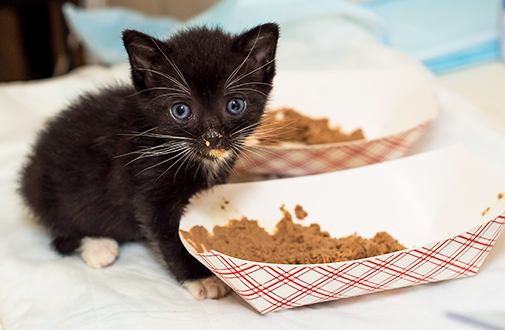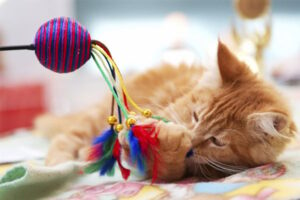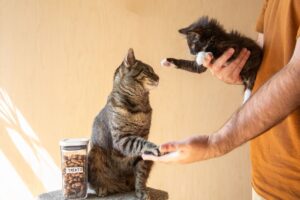Ensuring your kitten gets the right nutrition is important for its growth, development, and long-term health. Here are seven of the best feeding tips to keep your kitten healthy.
1. Know what nutrition your kitten needs to stay healthy
To keep up with rapid growth and development, kittens must eat large amounts of protein and fat. To stay healthy and grow properly, kittens need more calories per pound of body weight than adult cats. It is important to feed kitten food, which contains more essential nutrients than food for adult cats.
2. Put high-quality protein first
Kittens need a lot of protein in their diet. It is important for maintaining growth, building muscle, and repairing cells. As a first ingredient, look for cat food that is rich in animal protein, such as chicken, turkey, or fish. These protein sources provide your kitten with the amino acids he needs to stay healthy.
3. Make sure you eat enough fat
Fat is an important source of energy and helps the body absorb vitamins dissolved in fat. You can also see more clearly and your brain becomes stronger. Omega-3 fatty acids, such as DHA, are especially good for kittens because they help with brain development and eye function. Make sure the kitten food you choose contains the right amount of fat, including a variety of important fatty acids.
4. Add minerals and vitamins that the body needs
Kittens need a variety of minerals and vitamins, such as calcium and phosphorus, in their food to help their bones grow and develop. To keep your bones healthy, you need the right amount of calcium and iron. Vitamins A, E, and C are important for healthy vision, healthy skin, and a healthy nervous system. These nutrients are found in the right amounts in high-quality kitten food.
5. Don’t forget to drink water
Kittens and kittens need to drink plenty of water. They should always have access to clean, fresh water. Young cats can quickly become ill if they do not drink enough water. They can get some of the water they need from wet food, but this should not be their only water source.
6. Pay close attention to nutrition and growth
Kittens grow quickly and as they grow, their food needs increase. It is important to monitor their growth and vary the amount of food they eat if necessary. Overnutrition can make people fat, and undernutrition can prevent them from getting enough nutrients. Follow the feeding instructions on your kitten’s diet and make any necessary adjustments based on your kitten’s growth and energy profile.
7. Don’t make these nutritional mistakes
Don’t give babies cow’s milk because many cats cannot digest lactose, which can upset their stomachs. Kittens should not eat food made for adult cats because it does not contain enough calories for growth. Also, don’t take too many vitamins and minerals as supplements as this can be harmful to you. Stick to a healthy diet for your kitten and check with your vet before feeding him or her any additives.
Use health tips for the best results
To ensure that your kitten grows up healthy, following these feeding tips goes beyond choosing the right food. This is also to ensure that they have a varied diet and lifestyle. Regular visits to the vet are necessary to monitor their health and make any necessary changes to their food as they grow.
Feeding Schedules and Practices
Kittens should be fed three to four times a day. Regular feeding supports their fast metabolism, giving them consistent energy throughout the day. As they get older, they may not need to be fed as often, but the nutrients in their food must remain high to help them maintain growth and development.
Choosing the Right Kitten Food
To choose the right food, you need to look at the nutrition facts and ingredient lists. A veterinarian must approve kitten-specific food. Brands that conduct feeding trials and nutrition studies for kittens give you more confidence in the quality of their food.
The Role of Wet and Dry Food
Offering kittens dry and wet food can keep their diet interesting and them hungry. Wet food helps you stay hydrated, while dry food is good for your teeth. When choosing between wet and dry food, you should take into account what your cat likes, his health, and nutritional needs.
Conclusion
One of the most important parts of pet care is making sure your kitten is getting the right nutrition. It can help you live a long and healthy life. Making sure your kitten gets the best start is easy if you follow these seven feeding tips. If you take your baby to the vet regularly and pay close attention to his diet, your baby will grow into a healthy and happy adult cat.
By paying close attention to your kitten’s dietary and nutritional needs, you can enjoy the satisfying experience of watching your kitten grow into a strong, healthy cat. Remember, the effort you put into making sure they eat well in the first few months will pay off, and so will your long-term happiness.
FAQs
1. Which protein is best for kittens?
Kittens can get all the important amino acids they need for growth and development from high-quality animal proteins such as chicken, turkey, or fish. Look for cat food with these proteins as the main ingredients.
2. How much food should I feed my cat every day?
The amount of food you give your baby depends on his age, size, and activity level. Kittens should generally be fed according to the instructions on the cat food package, tailored to their size and needs. Typically, kittens should be fed small amounts three to four times a day.
3. Is it important to give cats milk?
Many kittens are unable to digest lactose, which can upset their stomachs. Therefore, do not give them milk. Instead, you should offer them kitten milk replacer and standard food as they need it, especially as they transition from breast milk to solid food.
4. Can I feed my kitten food intended for adult cats?
It is not a good idea to feed adult cat food to babies because it does not contain enough nutrients to help the kitten grow. Kittens need food rich in protein and fat so they can grow and develop quickly.
5. How do I know if my cat is drinking enough water?
Normal urination, moist lips, and skin that stretches easily are all signs that you are well-hydrated. Kittens should always have access to clean, fresh water. If you notice signs of dehydration, such as your pet’s fatigue, dry mouth, or skin that lacks elasticity, call your vet immediately.



